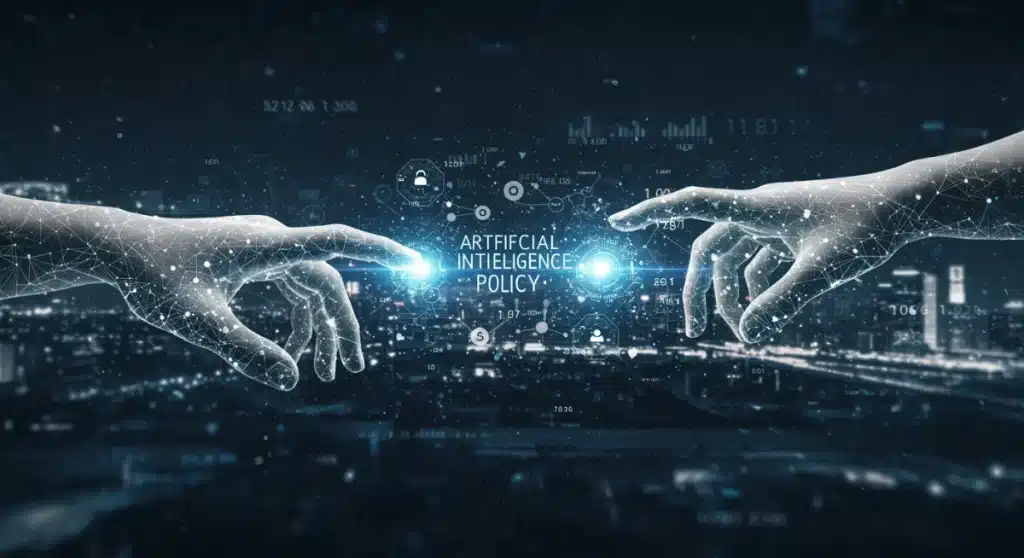The 2025 AI Policy: Ethical Frameworks & Innovation Impact

The 2025 Policy on Artificial Intelligence, a landmark legislative effort, is poised to reshape ethical considerations and innovation trajectories within the burgeoning AI sector globally.
As the digital frontier rapidly expands, the imperative for responsible governance of artificial intelligence (AI) grows stronger. The 2025 Policy on Artificial Intelligence: Ethical Frameworks and Their Impact on Innovation emerges as a pivotal legislative initiative, poised to fundamentally reshape how AI is developed, deployed, and integrated into our daily lives. This groundbreaking policy aims to strike a delicate balance between fostering technological progress and ensuring ethical safeguards.
Understanding the Core of The 2025 AI Policy
The recently unveiled 2025 AI Policy represents a concerted global effort to establish comprehensive guidelines for artificial intelligence. This policy, set to take full effect by early 2025, moves beyond general principles, laying down concrete ethical frameworks designed to address the complex challenges posed by advanced AI systems.
Its core tenets revolve around transparency, accountability, and human-centric design, aiming to prevent misuse and ensure AI benefits society broadly. Stakeholders across technological, governmental, and academic sectors have been actively involved in its formulation, reflecting a broad consensus on the urgent need for regulation in this critical domain.
Key Pillars of the Ethical Framework
The policy introduces several foundational pillars intended to guide AI development and deployment. These pillars are not merely suggestions but will carry significant legal weight, influencing everything from research grants to product certifications.
- Transparency and Explainability: AI systems must be designed to allow for understanding of their decision-making processes, especially in high-stakes applications.
- Accountability and Governance: Clear lines of responsibility are established for AI system outcomes, ensuring that developers and deployers are held liable.
- Fairness and Non-discrimination: Measures are mandated to prevent algorithmic bias and ensure equitable treatment across diverse populations.
- Data Privacy and Security: Enhanced protections for personal data used in AI training and operation are central to the policy’s ethical stance.
Navigating the Impact on AI Innovation and Development
The implementation of The 2025 Policy on Artificial Intelligence: Ethical Frameworks and Their Impact on Innovation is expected to have a multifaceted effect on the pace and direction of AI innovation. While some initial concerns have been raised regarding potential bureaucratic hurdles, many experts believe that a clear regulatory environment will ultimately foster more sustainable and trustworthy innovation.
Startups and established tech giants alike are already beginning to re-evaluate their AI pipelines, integrating ethical considerations from the earliest stages of design. This shift is not just about compliance; it’s about building user trust and opening new markets for ethically sound AI solutions.
Challenges and Opportunities for Developers
Developers face the immediate challenge of adapting existing AI models and development practices to meet the new policy’s requirements. This includes investing in explainable AI (XAI) technologies and robust bias detection tools. However, these challenges also present significant opportunities for innovation.
Companies that proactively embrace these ethical frameworks can gain a competitive edge, positioning themselves as leaders in responsible AI. The demand for specialized skills in AI ethics, compliance, and secure data handling is projected to surge, creating new career pathways within the tech sector.
- Increased Investment in XAI: Development of tools that make AI decisions understandable will accelerate.
- Ethical AI by Design: A shift towards embedding ethical considerations from concept to deployment.
- New Market Creation: Emergence of services and products focused on AI auditing, compliance, and ethical certification.
- Talent Demand: Growing need for AI ethicists, legal experts, and specialized engineers.
Global Implications and International Cooperation
The 2025 AI Policy is not an isolated national initiative; it reflects a broader global movement towards regulating AI. Its principles are expected to influence international standards and foster greater cooperation among nations. This interconnectedness is crucial, given the borderless nature of digital technologies.
Discussions are already underway at various international forums to harmonize AI regulations, aiming to create a consistent global framework. Such harmonization would significantly reduce compliance burdens for multinational corporations and facilitate the ethical deployment of AI across different jurisdictions.

Towards a Unified Global AI Standard
While complete uniformity remains a long-term goal, the 2025 policy serves as a strong precedent for other regions considering their own AI legislation. Its emphasis on core ethical values provides a common ground for international dialogue and the potential for mutually recognized certifications and standards.
This push for global standards is vital for preventing regulatory fragmentation, which could otherwise stifle innovation and create safe havens for unethical AI practices. Collaboration will be key to addressing cross-border AI challenges, such as data governance and the ethical use of autonomous systems.
Ensuring Fairness and Mitigating Bias in AI Systems
A cornerstone of The 2025 Policy on Artificial Intelligence: Ethical Frameworks and Their Impact on Innovation is its robust focus on ensuring fairness and actively mitigating bias in AI systems. Algorithmic bias, often stemming from biased training data or flawed design, can lead to discriminatory outcomes in critical areas like employment, credit, and criminal justice.
The policy mandates rigorous testing and auditing procedures to identify and eliminate such biases, requiring developers to demonstrate due diligence in creating equitable AI. This proactive approach is designed to build public trust and ensure that AI serves as an equalizer, rather than exacerbating existing societal inequalities.
Practical Steps to Combat Algorithmic Bias
Compliance with the fairness mandate will require developers to adopt new methodologies and tools. This includes implementing diverse and representative datasets, employing fairness metrics during model evaluation, and establishing human oversight mechanisms to review AI decisions.
Moreover, the policy encourages the development of AI systems that can explain their reasoning in a way that highlights potential biases, allowing for corrective action. Education and training for AI professionals on ethical considerations and bias detection will also be critical components of this effort.
The Role of Data Governance and Privacy in the New Policy
Data is the lifeblood of AI, and its responsible management is paramount. The 2025 AI Policy significantly strengthens data governance and privacy requirements, building upon existing regulations like GDPR and CCPA but tailoring them specifically for AI contexts. This includes stricter rules around data collection, storage, processing, and sharing, particularly for sensitive personal information.
The policy emphasizes the principle of ‘data minimization,’ meaning AI systems should only collect and use data that is strictly necessary for their intended purpose. Furthermore, individuals will have enhanced rights regarding their data, including the right to access, correct, and erase information used by AI systems.
Protecting User Data in AI Applications
For organizations developing and deploying AI, this means a heightened focus on data security and privacy-preserving technologies. Techniques such as differential privacy and federated learning are expected to gain wider adoption as companies strive to train powerful AI models without compromising individual privacy.
The policy also introduces requirements for regular data protection impact assessments (DPIAs) for high-risk AI systems, ensuring that potential privacy risks are identified and mitigated before systems are deployed. Non-compliance could result in substantial penalties, underscoring the seriousness of these new data governance mandates.
Accountability and Liability Frameworks in Focus
One of the most significant advancements within The 2025 Policy on Artificial Intelligence: Ethical Frameworks and Their Impact on Innovation is the establishment of clear accountability and liability frameworks. Historically, assigning responsibility for AI-driven errors or harms has been a complex legal challenge. This new policy seeks to clarify who is responsible when an AI system malfunctions or causes unintended negative consequences.
The policy distinguishes between AI developers, deployers, and users, outlining specific duties and liabilities for each. This clarity is crucial for fostering trust in AI technologies and providing avenues for redress when harms occur. It moves AI from a ‘black box’ legal vacuum to a regulated domain with defined responsibilities.
Defining Responsibilities for AI Incidents
Under the new framework, developers are held accountable for designing safe and compliant AI systems, while deployers (those who implement and operate AI) are responsible for ensuring the systems are used ethically and within their intended parameters. Users also have a role in following guidelines and reporting issues.
The policy introduces mechanisms for independent audits and certifications to verify compliance, and it lays the groundwork for compensation schemes for individuals affected by AI failures. This robust approach to liability aims to incentivize responsible AI development and deployment across the board.
- Developer Liability: For design flaws, ethical breaches, or non-compliance.
- Deployer Responsibility: For ethical operation, oversight, and appropriate use of AI.
- Independent Audits: Verification of AI system compliance and safety.
- Redress Mechanisms: Clear pathways for individuals to seek compensation for AI-caused harm.
Future-Proofing AI: Adaptability and Continuous Review
Recognizing the rapid pace of technological evolution, The 2025 Policy on Artificial Intelligence: Ethical Frameworks and Their Impact on Innovation incorporates mechanisms for adaptability and continuous review. The policy is designed not as a static document but as a living framework capable of evolving alongside AI advancements. This forward-looking approach ensures that regulations remain relevant and effective, preventing them from becoming obsolete as new AI capabilities emerge.
Regular reviews and updates are mandated, involving input from a diverse range of experts, including ethicists, technologists, legal scholars, and civil society representatives. This collaborative model aims to balance regulatory stability with the flexibility needed to address unforeseen challenges and opportunities in the AI landscape.
Mechanisms for Policy Evolution
The policy outlines specific triggers for review, such as the introduction of new general-purpose AI models or significant shifts in AI deployment patterns. It also establishes advisory boards tasked with monitoring AI trends and recommending necessary adjustments to the regulatory framework.
This commitment to dynamic governance is essential for future-proofing AI regulation, ensuring that the ethical frameworks continue to foster innovation while safeguarding societal well-being in the long term. It’s a proactive stance against potential future risks while embracing the transformative potential of AI.
| Key Aspect | Brief Description |
|---|---|
| Ethical Frameworks | Mandates transparency, accountability, fairness, and data privacy in AI development. |
| Innovation Impact | Encourages responsible AI innovation, fostering trust and new market opportunities. |
| Global Cooperation | Aims to harmonize international AI standards to prevent fragmentation. |
| Accountability | Establishes clear liability for AI developers and deployers for system outcomes. |
Frequently Asked Questions About The 2025 AI Policy
The primary goal is to establish comprehensive ethical frameworks for AI development and deployment, ensuring responsible innovation while safeguarding societal well-being and fundamental rights.
While introducing compliance challenges, the policy is expected to foster trustworthy AI innovation by building public trust and creating new market opportunities for ethically sound AI solutions.
The policy strongly emphasizes transparency, accountability, fairness, non-discrimination, data privacy, and security as core ethical principles for all AI systems.
Yes, the policy is anticipated to serve as a significant precedent, influencing global standards and fostering international cooperation towards harmonized AI regulatory frameworks worldwide.
The policy strengthens data governance, mandating data minimization, enhanced privacy protections, and regular impact assessments for AI systems, giving individuals greater control over their data.
Looking Ahead: The Future of AI Governance
The 2025 Policy on Artificial Intelligence marks a decisive turning point in the global discourse on AI governance. Its implementation will undoubtedly usher in a new era of responsible AI, where ethical considerations are as integral as technological capabilities. What happens next involves continuous adaptation from developers, rigorous oversight from regulators, and an ongoing dialogue among all stakeholders to refine and expand these frameworks. We can expect to see further international alignment, increased investment in ethical AI tools, and a heightened public expectation for AI that is both innovative and trustworthy.





